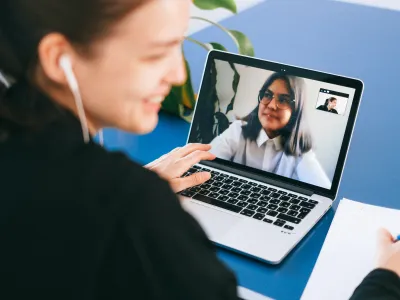
Making Reflection Effective
Include this article in your Skills Builder Journal. It could help you develop... ![]()
![]()
![]()

Reflection. What is it? And why should we do it? We spoke to Kath - a reflection expert, who works in a range of setting from hard to reach communities to after school clubs and community centres - about what the benefits of reflecting are and tips on how we can do it ourselves. Here’s what she had to say...
What is reflection?
In the same way a mirror reflects a picture back at you, reflection is about taking time out to have a look at what has just happened and what you want to do moving forward. This is likely something you already do without even realising; like when you’re on the bus and you think back through what happened in your day, how it made you feel and what you will do next. This is reflection.

Why is it so important?
Reflection allows us to learn from things that have happened, celebrate success and make a plan moving forward. It gives us the power to make changes in our lives.
If we don’t stop to think about what has happened; what went well, what went badly and what we learnt, we are essentially walking blindly.
Don’t get me wrong, there are times when ‘just walking ahead’ is a massive achievement - but if we never stopped to reflect on experiences, we wouldn’t learn lessons from past experiences.

How do I get the most out of my reflection?
Consider what you want to reflect on. It is helpful to consider how this may be different depending on the regularity - if this is a daily thing using repetition and tracking progress may be a good place to start. If this is a one off, your questions may be more specific to the situation and more in depth.
The key elements of reflection should always be;
- Looking back - what did I do well/what can I improve?
- How do I want to make changes/put this into practice moving forward?
- Who can help me with this?
Using these elements means that you will always have the balance of celebrating successes, giving feedback and making a plan moving forward.

Do I have to reflect on my own?
You can reflect on your own or with others, depending on what you are reflecting on and how you best learn.
Reflecting on your own can help you to explore your thoughts in depth and in privacy, whereas in a group you can also discuss and gain other people’s points of view which can be really helpful too!

How can I set up a reflection session with my friends?
First you need to find a group of people who want to reflect and are committed to the same level as you.
Set a date and a time and set some ground rules - these can be as simple as ‘share your thoughts openly’ or ‘message if you can’t come’ - but being on the same page is really important when working in a group.
Choose someone to lead the session. This doesn’t need to be teacher style, but more a person who will make sure that material you are using in the group is prepared and will keep you on track, no matter how much chatting you want to do.
Keep notes! I have so many journals full of random reflections, some from many years back. But having the notes helps me to look back and check in on what I was reflecting on and if I have put my plans into action. Even a couple of years later it can be really cool to see how much you have changed from one moment a few years ago.

What are some key questions to ask when reflecting?
- Describe your experience
- What did I do well?
- What could I improve on?
- What did I enjoy the most?
- How did I feel?
- What did I want to achieve?
- Did I achieve it?
- What did I learn from this?
- How will I put this learning into practice moving forward?
- Why does this matter?

How can I put my learnings into practice after reflecting?
We all know that it’s super easy to have grand plans, but getting these plans done is the tricky part. It’s the same when reflecting - we can think back as much as we want but unless we make a plan on how to learn something from our reflection it’s pointless.
With this in mind, I would argue that asking ‘How will you put what you learnt into practise moving forward?’ is the most important question.
I like to use this question to set a SMART goal:
Once you’ve set your SMART goal, write it down somewhere or create a visual reminder for yourself to do it and keep checking in on how you’re doing.
Be kind to yourself, and if you need to, adjust your goal to make it more achievable. If this stuff was easy we wouldn’t need to reflect - but keep going!
What is your number one tip for getting the most out of reflecting?
Commit to it! Trying new things always feel weird to start with, but committing to doing something for a week or two means you can give it a real chance - the same way training for a marathon takes dedication, the marathon of the mind also takes dedication!





